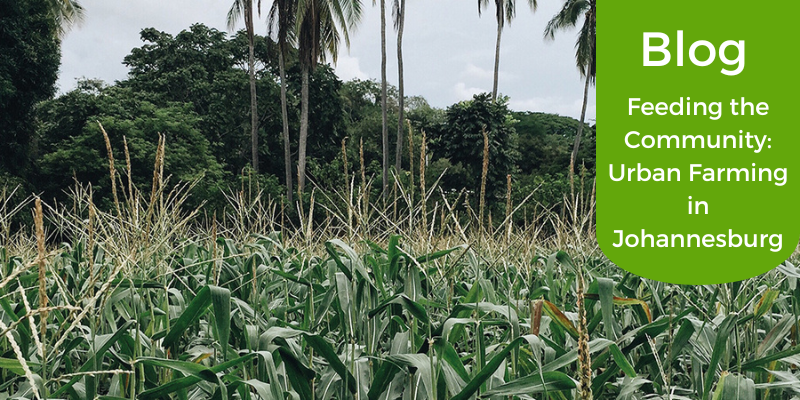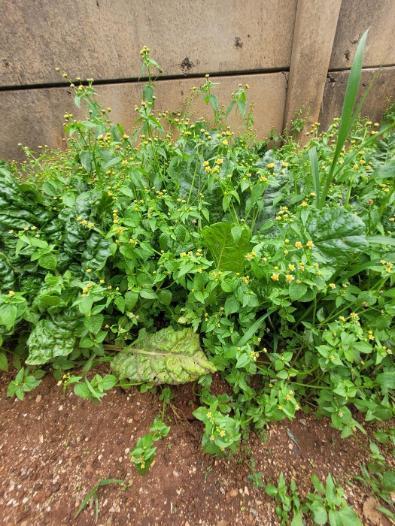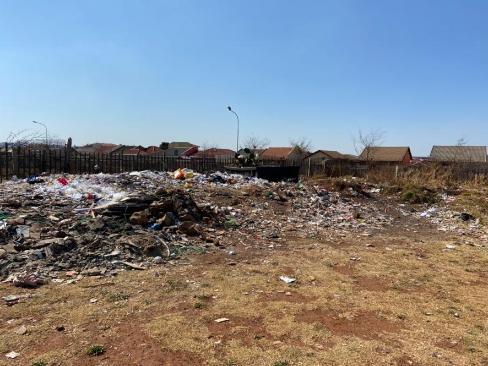Blog: Feeding the Community - Urban Farming in Johannesburg
IGDC Member, Henrice Altink, and Tim Hart discuss urban farming in Johannesburg in this blog.

There are more than 300 farms in Johannesburg and new ones are sprouting up across the city, including in informal settlements. Urban agriculture (UA) has the potential to enhance food security in Johannesburg – more than 40 % of households are food insecure – and reduce poverty through job creation. Our research into the production and consumption of traditional vegetables by migrant communities in Johannesburg shows that to fulfil this potential, urban farmers in the city need more support as most are only eking out a precarious existing on infertile soils.
UA in Johannesburg takes various forms, ranging from backyard and community gardening on land provided by churches and schools to larger-scale urban farms. Many urban farms in the city were set up with support from the government, NGOs and other organisations (Rudolph, Mello, and Muchesa, 2021:131). The Ruterang Agricycle project, for instance, was set up in 2013 and has received seeds, manure and tools from the Gauteng Department of Agriculture and Rural Development (GDARD). One of the seedling farms we visited in Braamfontein was the recipient of support from the Urban Agriculture Initiative (UAI), a not-for-profit social enterprise that provides training and other support to grow fresh produce in limited spaces, such as rooftops.
Most urban farms we visited were based on school land or land adjacent to schools. Some farmers had also taken over existing farms that had gone into decline. The farmers are driven not by business profit but by the social benefits that the farm can bestow on the local community. Take, for example, Joseph, whose farm is close to the Protea Glen shopping mall. On approximately 2000m2 and in polytunnels, he grows not just spinach, kale, lettuce and other commonly consumed vegetables but also traditional leafy vegetables, such as pumpkin leaves, okra leaves, and mustard spinach (mutshaina), which are nutrient-dense and can reduce malnutrition (Mwadzingeni et al., 2021). Like most urban farmers we interviewed, Joseph sells his produce to community members who visit his farm. As the land is adjacent to a school, teachers and parents comprise a large proportion of his clientele. Joseph has plans to extend his clientele base by opening a spaza shop (tuck shop) to sell his produce and wants to undertake a survey in the neighbourhood to better understand the vegetables that people would like to eat so that he can better meet the community’s needs.
-371x494.jpg)
Image 1: mustard spinach (mutshaina)
Like most of the other urban farmers we interviewed, Joseph is an organic farmer. He grows most of his crops in deep trenches, which improves soil quality, and uses only natural fertilisers and pesticides. Recently, he started a scheme that offers a discount for vegetables for anyone who can bring him a jerrycan of urine. Urine is rich in nitrogen and phosphorus and has been used for centuries across parts of Africa and Asia as a fertiliser for plants. He also has plans to keep rabbits on his farm not only for manure, like some other urban farmers already do, but also to improve the community’s food security as rabbit meat is nutrient-rich and affordable. Rabbit farming is growing in South Africa, partly because start-up costs are relatively low and recovered within six to eight months (SME South Africa).
Joseph is currently providing primary school learners with raised beds so they can grow crops to take home to their family. Alongside enhancing their family’s food security, the learners acquire key agricultural skills that can help them secure a job in future. And Joseph also feeds the community directly. Every weekend, he and his wife cook for about 40 people from the local neighbourhood and during the week, they cook for the workers and some hungry community members. Like some other farmers in the area, he allows community members to freely pick the leaves of seasonal leafy vegetables that germinate after the first summer rains in the uncultivated areas of the farm, including blackjack and amaranth. Some migrants in the area like the leaves of young sweet potato and pumpkin plants, and Joseph allows them to pick these when the crops are grown.

Image 2: Blackjack
But Joseph and other urban framers in the city need more support to scale-up their enterprises so they can feed more people in the community and provide more local jobs. They need:
- Land: Many urban farmers we interviewed found it difficult to access land, did not hold a secure tenancy, and cultivated land with poor soil. Joseph has an agreement with the school that he can use the land for 15 years, and some of the land he is currently converting into deep-trenched raised beds for the school children was a waste field. However, there are large tracts of unused public and privately-owned land in Johannesburg that could be used for more urban farms.
- Water: Urban farmers need access to a reliable supply of water. Many urban farmers we spoke to struggled to irrigate their lands because of load-shedding (rolling blackout).
- Financial support: Many urban farms in the city are largely driven by social benefits. Support to buy seeds, tools and other agri-inputs would enable them to balance their books.
- Training: Many of the farmers we interviewed had received training in agriculture. Some had a degree in agricultural sciences and others had undergone training provided by NGOs. But all would benefit from support from extension services, such as training in organic soil management and climate-smart agriculture.
- Market access: Our research has shown that there is a demand from rural migrants and African migrants, who are amongst the most food insecure in Johannesburg, for certain types of vegetables, such as pumpkin leaves and chomolia (African kale), that are not widely sold in the city. Most urban farmers only grow produce that is commonly sold and eaten, such as spinach, kale, cabbage and tomatoes. Traditional leafy vegetables can easily be grown locally and there is a market for them. Joseph, for instance, sells rape, African nightshade (managu), chomolia, and okra leaves to migrants from Zimbabwe and Mozambique. To supply the migrant market for traditional leafy vegetables, farmers need to link up with the traders of these vegetables, while migrants need to be made aware of where these vegetables can be purchased – directly from the farms or traders.
- Other support: Urban farms need more trained staff to scale up their activities. The Rutegang Agri-cycling farm employs student interns from a local college. But most of the farms we visited used only volunteers.

Image 3: turning a waste field into raised beds
In his review of urban agriculture in Cape Town, Kanosvamhira (2019) has presented the formation of Farmers’ Associations, which currently only exist at the national and provincial level, as an essential strategy to enable urban farmers to ensure that extension services and other relevant bodies meet their specific needs. Urban farmers in Johannesburg already come together in various groups. Several of our interviewees, for instance, attend the monthly farmers’ lab organised by Izindaba Zokudla which teaches farmers practical organic techniques, and are part of seed-swapping groups. These groups can form the basis for forming a Farmers’ Association that, alongside the support mentioned above, can help them improve food security in their locality.
Professor Henrice Altink is a professor of Modern History at the University of York.
Dr Tim Hart is a chief research specialist and social anthropologist in the Developmental, Capable and Ethical State Research Group at the HSRC.
Pictures provided by: Henrice Altink and Alex Hughes (Newcastle University).
Contact us
Interdisciplinary Global Development Centre
igdc@york.ac.uk
01904 323716
Department of Politics and International Relations, University of York, Heslington, York, YO10 5DD, UK
Twitter
Contact us
Interdisciplinary Global Development Centre
igdc@york.ac.uk
01904 323716
Department of Politics and International Relations, University of York, Heslington, York, YO10 5DD, UK
Twitter